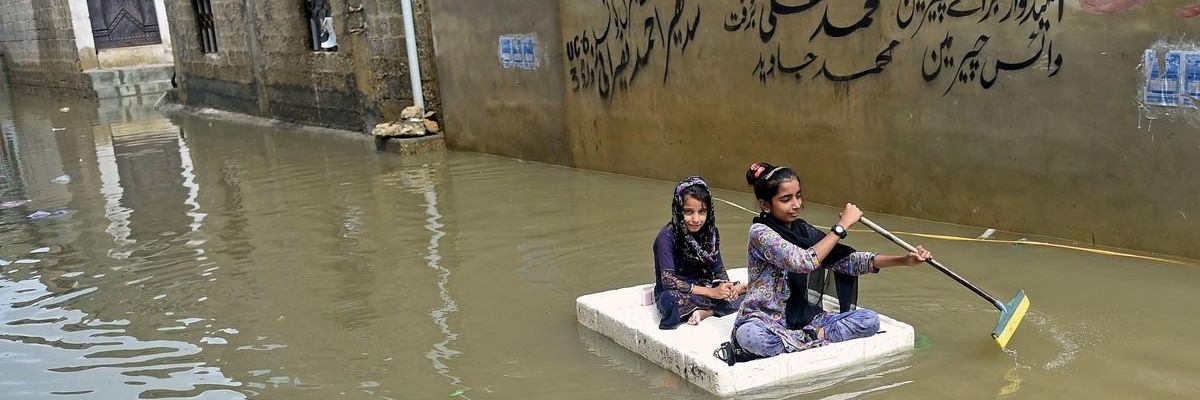While the 1950s saw a marked increase in the consumption of fossil fuels, the 1980s would see a significant dependence on oil and gas that launched the world into the throes of an irreversible climate crisis. In the 1990s, the world's most incessant polluters began to understand that fossil fuels were causing "climate change" and committed to reducing greenhouse gas emissions and protecting the planet. This period also saw small island countries decry the disastrous impacts of sea level rise. Learning this as I matured, I realized that I could either be part of the problem or the solution.
Climate change politics are strongly linked with the economic vitality of countries, and wealthier, more developed nations took their time in listening to the needs of those most impacted by the climate crisis. In the early 1990s, it took more than a decade for international bodies to understand "Loss and Damage," which is defined as the, "permanent loss or repairable damage caused by the manifestations of climate change, including both severe weather events and slow-onset events, such as sea level rise and desertification."
The repercussions for communities living at the forefront of the crisis--predominantly communities with the smallest carbon footprint and greenhouse gas emissions--are incalculable. Just this year, the Intergovernmental Panel on Climate Change (IPCC) released a report definitively linking "climate change" to anthropogenic activities--humans are responsible for our current climate crisis--and that those who did less to contribute to it are more vulnerable to its effects.
In 2013, Super Typhoon Haiyan devastated the Philippines, causing more than $5 billion in damage. While Haiyan was a destructive and deadly storm, it did facilitate conversations around creating a mechanism for addressing loss and damage in developing countries more vulnerable to climate change. Developed in 2015, Article 8 of the Paris Agreement includes explicit language on loss and damage.
However, an absent framework to address loss and damage is the current injustice of our generation; those of us living daily with the frightening impacts of climate change are more than tired of the empty promises and inaction that often characterize the responses of developed nations.
Developing nations--particularly countries in Africa and Oceania--are adamant that wealthier nations provide loss and damage resources to prepare--and reimburse--communities for the significant environmental, social, political, and economic impacts they've experienced.
In 2019, developing countries under the United Nations Framework Convention on Climate Change (UNFCCC) came together to demand a dedicated body to operationalize an approach to address loss and damage and dedicate funding for countries struggling in the wake of tremendous climate change impacts. The first demand gained momentum through the creation of the Santiago Network on Loss and Damage, but the second demand has yet to find firm footing, despite the loud and visible calls of countries and civil society organizations.
I have the privilege of belonging to a generation that sees beyond past mistakes and is ready to be an active stakeholder to create tangible climate action. In 2020, when the world was facing the global pandemic, it became too evident that developing countries were facing devastating climate impacts. We come together as youth leaders from the Global South and North to demand loss and damage resources and resolute action to address loss and damage, especially in frontline communities.
During 2021's 26th Conference of Parties gathering in Glasgow, there was a demand to establish an effective, accessible, and grants-based loss and damage framework to supplement existing climate finance processes. Developing countries compromised with the Glasgow Dialogue on Loss and Damage Finance, a three-year dialogue to assess whether there are resources available to address loss and damage. The Glasgow Dialogue is not a commitment to establishing an international loss and damage program. However, it is still a formal examination of the gaps that exist in climate financing for slow and rapid-onset climate events.
As we prepare for COP27 in Egypt, climate justice activists--particularly youth--remain determined to secure an impactful loss and damage framework. Look no further than the flooding in Pakistan and South Africa, the Mauritius food shortage, and the drought in Sudan for clear examples of the crisis our planet is experiencing and the vulnerability of populations who've contributed the least to this crisis. And it's spreading: deadly floods in Germany, cyclones in Florida, and the California wildfires are clarion calls for more aggressive action.
The Glasgow Dialogue has made it clear where there are funding gaps for loss and damage financing and COP27 is an opportunity to make data-driven decisions to resource efforts to address loss and damage for frontline communities.
Dedicated financing for loss and damage programming is a strong step towards global solidarity. Now that countries like Scotland and Denmark have spoken up, we are seeing clear steps towards our shared goal of resourcing an issue in dire need of attention.
I engage in this work so that another 5-year-old in Rwanda or Guinea or Fiji or Senegal or Pakistan or any vulnerable developing country is spared the heartache of living through the terror of an earth that is clearly showing it's dissatisfaction and disdain for its stewards. But to get to that world, if we are to have any real impact, bold steps must be taken to engage frontline communities, center their needs and solutions, and collectively address the climate crisis of our generation.
